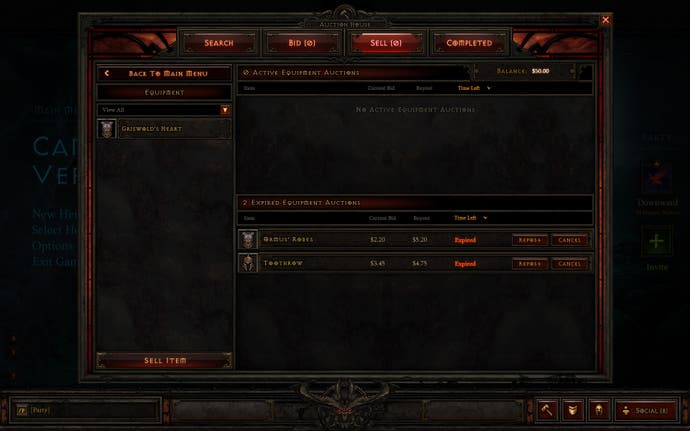The How and Why of the Diablo 3 Auction House
An in-depth look at the first official real money market.
The facts
Use of the Diablo III auction house is completely optional. There will be two separate versions, one for trading with real money, and one for trading in the in-game currency, gold. You can also trade directly with other players by meeting up and dumping items into a consensual trade window "exactly like World of Warcraft's", according to lead designer Jay Wilson.
Blizzard doesn't plan to divide the community between real money players and game gold traders. The one restriction is that there will be no real money auction house for players of the game's Hardcore mode, in which character death and equipment loss is permanent. ("We felt like, if someone sunk $100 into a bunch of items on their character and they lost them, that wouldn't be a very good experience," says Pardo with some understatement.)
Each time you select an item for sale, you'll choose which auction house you want to list it on. You can sell almost any item in the game: equipment, gold, crafting materials and customisation items such as gems. Blizzard is even considering allowing players to trade characters, but this won't be included at launch.
The auction houses will have all the features you might expect, including instant buyouts and auto-bidding. A 'smart search' function will find upgrades to your equipment for you, tailored to any of your characters and listed according to how beneficial it would be.
If you buy items on the real money auction house, you will pay using an "authorised payment method" - i.e. a credit card - attached to your Battle.net account. You can also choose to charge up your Battle.net account with an 'e-balance' of funds. Blizzard has no plans to sell 'prepaid' vouchers for players without credit cards, but Wilson doesn't rule it out. "It doesn't seem like a far stretch for something that we would do if there's a demand for it."

If you sell an item for cash, you're presented with a one-time option to either "cash out" or pay the funds into your Battle.net e-balance. If you choose the former - an option not available to all regions at launch - you'll receive the money via a third-party payment provider such as PayPal. (Blizzard is currently in negotiations to establish this partnership and can't announce it yet.) If you choose the latter, you can spend the money in the Diablo III auction house as well as on anything else that Blizzard sells: games, merchandise, World of Warcraft subscriptions and services. Choose carefully, as there's no way to extract cash from the Battle.net e-balance.
Blizzard will collect three separate fees: one for listing an item, one for selling it, and one for cashing out if you choose that option. Details on the latter are rather vague, but the listing and sale fees will be fixed and "nominal". Although the auction house is clearly designed to create additional revenue for Blizzard, the developer contends that there are gameplay reasons for charging players money - for listings, at least.
"We don't want every single item in the game to show up on the auction house," says Pardo. "We want people to be trading items of merit, items that really have meaningful, tangible value... A nominal listing fee helps make sure that players really want to list the item." That said, Blizzard will provide each player with a small number of free listings per week in order to stimulate trade and make it possible to begin trading without having to pay anything up front; list an item for free and sell it, and you've got a stake to play with without touching your credit card.
The rates are fixed, rather than a percentage, in order to ensure that Blizzard has no financial incentive to manipulate the game design, Wilson says. "It's our goal to make sure that the influence we have on the system is as minimal as possible," says Wilson. "We would not want to go in and create a bunch of super-rare items and profit off of that... So we as designers - or as people who want piles of money, because everybody wants piles of money, right? - we have no incentive to do that. We've designed the system specifically to not give us an incentive to do that." The developer's only commercial interest is in encouraging brisk trade.
